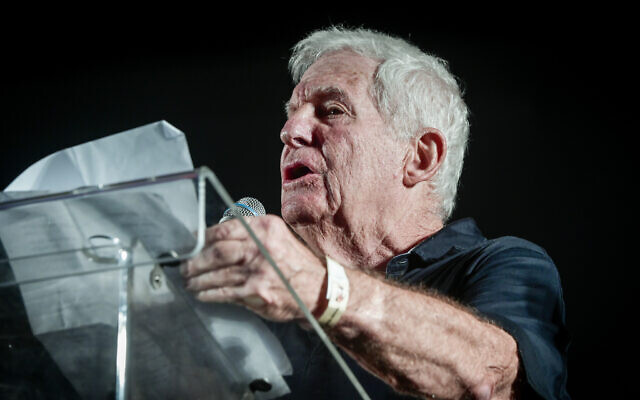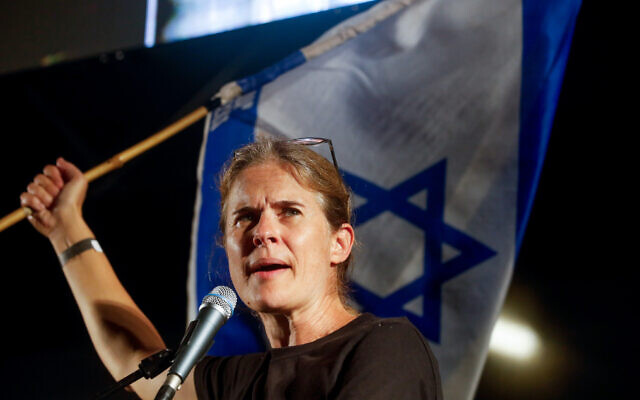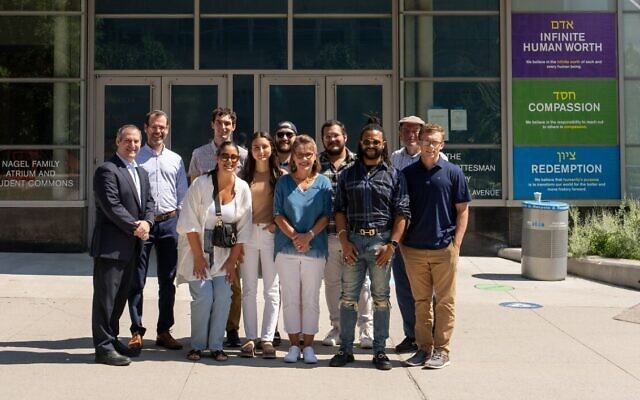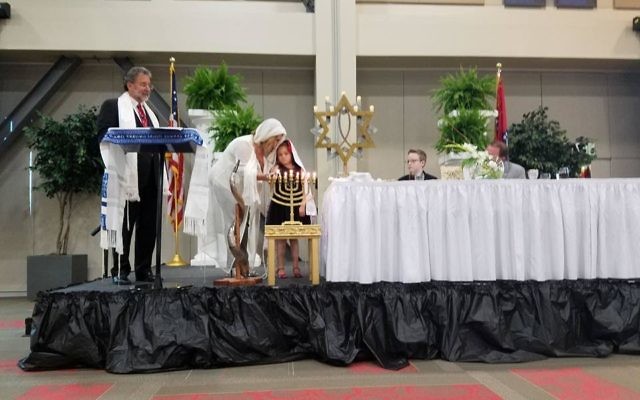‘The time to fight is now’: Masses nationwide rally against overhaul for 32nd week
Ex-IDF general pans PM for ‘handing country over
to lawbreaking’ far-right ministers; protest heads said to warn they may
shut Israel down if government defies court nixing of laws
Tens of thousands of Israelis protested Saturday against the judicial
overhaul in Tel Aviv and cities across the country, kicking off the
32nd straight week of protests against the legislative plan, days after
the government indicated that it still intends to pass the most critical
part of the package despite massive opposition.
At the main Tel Aviv protest, over 100,000 were in attendance,
according to Channel 13 news, which cited data from the CrowdSolutions
firm. Other rallies were held at some 150 locations.
Protesters gathered at Kaplan Square for the main part of the rally
and hundreds marched to the nearby home of Knesset Speaker Amir Ohana,
calling “We are not afraid,” waving flags and blowing horns outside
before eventually being pushed away by police. Hounding the homes of
government ministers has been a staple of anti-overhaul protests from
the get-go, echoing tactics employed last year by the Benjamin
Netanyahu-led opposition that eventually toppled the previous government
and returned the Likud party leader to power.
Earlier in the evening, police arrested three Palestinians, aged 16,
20 and 25, who unlawfully entered Israel. The three detained near Kaplan
Street were from the West Bank village of Aqraba, police said, adding
that they had apparently been in Israel working illegally and were
stopped due to the police’s state of high alert as they secured the
protest.
Among those addressing the Tel Aviv rally was retired general Amiram
Levin, who made a tearful plea to Likud ministers to “be brave” and
oppose the coalition’s judicial overhaul legislation.
Levin, who at various times headed the IDF Northern Command,
commanded the elite Sayeret Matkal unit and served as deputy director of
the Mossad spy agency, accused Prime Minister Benjamin Netanyahu of
wanting to hand the country over to criminals.
“Bibi wants to give the keys to the country to a group of awful
ministers, some of whom are convicted criminals and draft dodgers, to
ministers who encourage massacring Palestinians subject to our rule, to a
racist minister who loots the state budget and blocks funds for Arabs,
just because they are Arabs. To a justice minister who wants one branch
of government and no independent judiciary,” Levin said, apparently
referring to National Security Minister Itamar Ben Gvir, Finance
Minister Bezalel Smotrich, Justice Minister Yariv Levin and other
Orthodox members of the cabinet.
He said some of the most hardline ministers “don’t know what
democracy is because they and their aides grew up in a land that doesn’t
have one,” he said, referring to those in the government who live in
the West Bank, which is under Israeli military rule.

Former general Amiram Levin speaks during a
protest against the government’s judicial overhaul, in Tel Aviv, on
August 12, 2023.
“We won’t let Bibi and his group of ministers turn Israel into a
dictatorship. We won’t allow it and won’t stay silent until we win,” he
added, using the prime minister’s nickname.
Levin issued a direct plea to relatively moderate Likud ministers,
including Avi Dichter, Nir Barkat and Defense Minister Yoav Gallant,
reminding each of them of their friends and colleagues who fell in
battle during their military services: “Who would you want to go to war
with? Their successors, or the draft dodging gang of Ben Gvir, Smotrich,
and [Housing and Construction Minister Yitzhak] Goldknopf… the gang of
lawbreakers and warmongers… who discriminate against women and LGBTQ
people?”
“I call to you from here, this is the battle of our lives, but this
is also the opportunity of our lives — be brave. Here and all across
Israel you will find hundreds of thousands of successors of your
friends,” he said.
In her own speech at the rally, protest leader Shikma Bressler told
demonstrators that despite the current Knesset recess, the threat of the
coalition’s plans still looms.
“The Knesset may be on a break, but the coup continues at full
strength. In the crosshairs is anyone who doesn’t fall in line with the
rebellion declared by Netanyahu, led by the fascists and with the
support of the corrupt,” Bressler said. “Every one of us understands
that the time to fight is now.”

Prof. Shikma Bressler speaks during a
protest against the government’s judicial overhaul plans, in Tel Aviv,
on August 12, 2023.
Bressler went on to offer backing to police volunteers and military
reservists protesting the overhaul, as well as three women in top
positions — Michal Rosenbaum, director of the Companies Authority;
Attorney General Gali Baharav-Miara; and Supreme Court Chief Justice
Esther Hayut — who have all faced attacks from government members.
Also joining the Tel Aviv rally was Opposition Leader Yair Lapid, who
tweeted: “We come to Kaplan today to say that a government that doesn’t
obey the court, that doesn’t obey the law, is an illegal government.”
Netanyahu has refused to commit to honoring a theoretical High Court
of Justice decision striking down the reasonableness law — which was
passed into law and bars judicial review of government and ministerial
decisions on the grounds of their “reasonableness” — raising concerns of
a potential constitutional crisis.
In an unprecedented move, all 15 judges of the High Court will rule
on the law in September, setting up a showdown between the judiciary and
the government.
In addition to the rally in Tel Aviv, thousands of anti-overhaul
protesters held demonstrations in Jerusalem, Beersheba, Haifa and dozens
of other cities across the country.
Thousands of protesters intermittently blocked the Karkur Junction in
northern Israel, lighting flares, as police worked to remove them from
the road.

Demonstrators rally against the government’s judicial overhaul plans in Tel Aviv, August 12, 2023.
Protesters were reportedly preparing to completely shut down the
country if the government does not respect such a High Court ruling on
the “reasonableness” law or on the recusal law, which bars the court and
the attorney general from ordering a premier to step down — a move
apparently designed to allow Netanyahu to violate a conflict of interest
deal he signed.
The anti-overhaul protesters “are prepared for a complete paralysis
of the country, based on a general strike of the economy without a time
limit,” a source within the protest movement was cited as saying by
multiple Hebrew media outlets.
“Many important sectors of the economy have already joined the plan,”
the source said, expressing hope that the Histadrut national labor
union would join such action.
Netanyahu indicated a week ago
that his government will move ahead with changing the makeup of the
Judicial Selection Committee, perhaps the most far-reaching and
controversial measure in the judicial shakeup package. He intimated that
he was still seeking consensus on this. After that, he said, he would
shelve the rest of the judicial overhaul plan.
“We’ve already done quite a bit,” Netanyahu told the Bloomberg
financial news outlet. “I stopped the judicial legislation for three
months, seeking consensus from the other side – unfortunately not
getting it. Then [I] brought in a relatively minor part of the reform,
passed it,” he said, referencing the passage two weeks ago of the
controversial reasonableness law.
The current judicial selection bill, which was suspended in March but
is ready to be brought for its final readings at short notice, would
remake the Judicial Selection Committee, under which coalition and
Supreme Court representatives currently each have veto power over the
other’s candidates for the top court, requiring a consensus on such
appointments. Instead, the legislation would change the composition of
the panel so as to bring appointments throughout the judicial hierarchy
under near-absolute government control.

Demonstrators rally against the government’s judicial overhaul plans in Tel Aviv, August 12, 2023.
The government’s plans have continued to roil the country, particularly the military.
The chief of the Israeli Air Force, Maj. Gen. Tomer Bar, met Friday
with dozens of reservist pilots who have declared they would no longer
show up for volunteer duty to protest the overhaul, warning them that
the state of the force’s readiness was “worsening.”
An unconfirmed report by Channel 12 news added that Bar told pilots: “Instead of preparing for war, I’m dealing only with this.”
As the coalition advanced the first major piece of related
legislation last month, more than 10,000 reservists who frequently show
up for duty on a voluntary basis said they would no longer do so. The
reservists, some of whom have acted on their threats, have warned they
will not be able to serve in an undemocratic Israel, which some charge
the country will become if the government’s overhaul plans are realized.
https://www.timesofisrael.com/the-time-to-fight-is-now-masses-nationwide-rally-against-overhaul-for-32nd-week/?utm_campaign=daily-edition-2023-08-13&utm_medium=email&utm_source=The+Daily+Edition

































